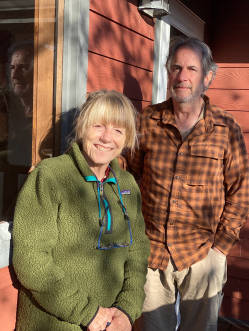by Zanetha Amani Matisse
Outreach and Communication Specialist, Orcas Community Resource Center
Celebrating Veteran’s Day, and acknowledging veterans and their service to this nation feels especially poignant this year. On this day, the Orcas Community Resource Center honors our island veterans. Allow us to introduce you to two veterans that are doing important work for our community.
Larry Hughes and Cindie McKenna are licensed social workers who work with the Orcas Community Resource Center and the newly formed Shelter Group. Hired in April, at the height of the pandemic, with funds from the Orcas Island Community Foundation Community Emergency Response Fund, they work with the OCRC’s most vulnerable clients: our homeless neighbors, and those needing acute mental health support. Prior to their work at OCRC, they worked as Designated Crisis Responders (DCR). Both are veterans, having served our nation prior to their careers in social services. Larry served in the Army in 1967-1969. Cindie, who retired in 1999, served in the Air Force for 22 years as a jet engine mechanic, and later as a mediator for the State of Oregon through the Air National Guard.
McKenna and her husband are avid outdoor enthusiasts. They routinely visited Orcas when taking part in ultra-endurance trail races held on island. The beautiful natural environment finally lured them to take root full-time in 2014. Previously, she had lived in Longview, where she still works every two weeks in the ER providing social services at St. John Medical Center. McKenna is an accomplished ceramicist and hopes to spend more time in her home studio when her workload allows it.
Hughes and his wife moved to Orcas seven years ago. They were moved by the natural splendor of the island and craved an existence quite different from New York City, where he’d spent several decades working with the city’s homeless. Upon landing on Orcas, Hughes presumed he would transition to working with the island’s seniors. He wasn’t expecting to find the level of poverty, substance abuse, homelessness and domestic violence that is quietly happening in our island hamlets.
After shelter-in-place orders were put into practice due to COVID-19, it became evident that our homeless islanders were particularly impacted, as they didn’t have homes to tuck into to weather the pandemic storm. Hughes and McKenna both agree that a key aspect of supporting their clients for long-term success relies on securing safe and stable places for their homeless clients to live.
When asked how islanders could support our homeless, as allies and community members, Hughes had this to say: “Being more willing to see people get help here, rather than just closing the door and saying ‘no, move them off-island’ is key. A lot of the people that we work with have been living here for years, some twenty years or more. They were productive and functional. They cared for family members or were caregivers for senior citizens. Now some of them aren’t, due to mental health, substance abuse, health issues, or some combination of that. But they still need the support of the community because they were here for years helping out. They can still be productive if there’s some way to do that. I think helping donate to the resource center to provide funding for what’s going on is a big help. But it needs a longer-term commitment. If we had property owners that had space that were willing to put a camper or trailer on their property, particularly secondary lots that are currently unused, for a period of time for someone to live in, and they could collect rent, that would be a big step forward. That would help make what we’re doing much more doable.”
Hughes and McKenna often pull on their own experience when working with clients. They both seek to provide the kind of support and assistance they would have liked to have had when they were younger and at their most vulnerable. McKenna sought out the Air Force as a means to educate herself, and to create a sense of family. The Air Force became her safe place, away from an abusive childhood, though she admits that being a woman in the military had its challenges. She was the only woman in her engine shop. She’s seen her clients through incredible hardships and considers mentorship an important part of her job as social worker.
“It’s almost like being a mentor — someone to help them get exposure to different situations, how to get through it, and develop insight,” McKenna said.
Hughes’ own experience with substance abuse led him to become a licensed social worker.
“I could have gotten sober much earlier, and not had to go through so much pain and misery, but I never met anyone that could provide that to me. So that’s what I’m trying to provide people now,” he said.
We want to thank Hughes and McKenna for their service — not only for their work here on Orcas, but for their work in the military and social services throughout their careers. We’re honored to have them in our community, helping our neighbors stay safe, sane and secure during these turbulent times. Thank you for your service!
The Orcas Community Resource Center provides social services to Orcas Islanders in need. For more information on this and other services, visit www.orcascrc.org, email info@orcascrc.org or call the Resource Center at 360-376-3184.




